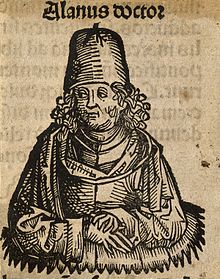Alain de Lille | |
|---|---|
 | |
| Born | 1128 Lille, France |
| Died | 1202–1203 |
| Academic background | |
| Alma mater | University of Paris |
| Influences | |
| Academic work | |
| Era | Medieval philosophy |
| School or tradition | Scholasticism |
| Main interests | Philosophy, mysticism, theology, poetry |
Alain de Lille (Alan of Lille; Latin: Alanus ab Insulis; c. 1128 – 1202/1203) was a French[1] theologian and poet. He was born in Lille some time before 1128. His exact date of death remains unclear as well, with most research pointing toward it being between 14 April 1202 and 5 April 1203. He is known for writing a number of works based upon the teachings of the liberal arts, with one of his most renowned poems, De planctu Naturae ("The Complaint of Nature"), focusing on sexual conduct among humans. Although Alain was widely known during his lifetime, little is known about his personal life.[2][3]
As a theologian, Alain de Lille opposed scholasticism in the second half of the 12th century. His philosophy is characterized by rationalism and mysticism. Alain claimed that reason, guided by prudence, could discover most truths about the physical order without help; but in order to understand religious truth and to know God, the wise must be believers.
- ^ Alain de Lille WRITTEN BY: The Editors of Encyclopaedia Britannica
- ^ Zott, Lynn (2003). Classical and Medieval Literature Criticism. Farmington Hills: Gale. ISBN 978-0-7876-5839-7.
- ^ Wetherbee, Winthrop. "Alan of Lille, De planctu Naturae: The Fall of Nature and the Survival of Poetry". The Journal of Medieval Latin 21 (2011): 223–51. http://www.jstor.org/stable/45019679/